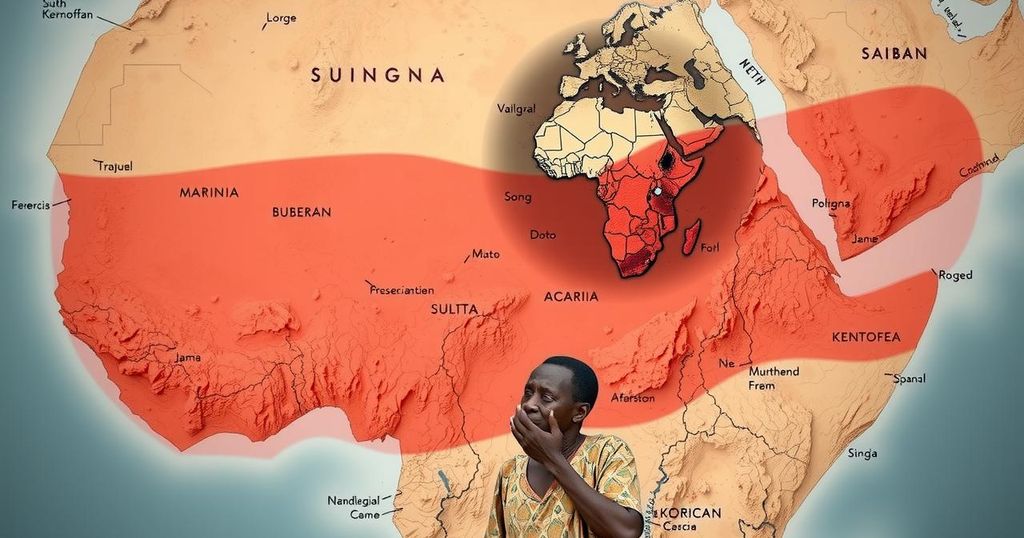Urgent Famine Crisis in Sudan: Over 24 Million Face Severe Hunger Amid Civil War

Sudan is facing a significant famine crisis affecting five regions, with 24.6 million people in urgent need of food aid due to a prolonged civil war. The humanitarian situation has deteriorated dramatically, with warnings from the Famine Review Committee about the risks of further spread of famine across the country. Efforts to mediate the conflict have failed, exacerbating the humanitarian emergency.
Sudan is experiencing a disastrous famine crisis that has impacted five regions, chiefly in Darfur and South Kordofan, as reported by an independent group of food security experts. Approximately 24.6 million individuals—nearly half of the nation’s population—are urgently in need of food assistance. This acute hunger crisis has been exacerbated by the ongoing civil war, which has lasted 20 months and devastated the nation’s agricultural and social structures. The civil conflict, rooted in a power struggle between the armed forces and the paramilitary Rapid Support Forces (RSF), was initiated by a coup in 2021 and escalated into full-blown warfare in 2023.
Despite numerous mediation efforts aimed at resolving the conflict, peace remains elusive, leading to one of the world’s gravest humanitarian emergencies. The United Nations-backed Famine Review Committee (FRC) has issued warnings regarding a potential “greater catastrophe” looming ahead if hostilities persist. The Integrated Food Phase Classification (IPC), a global initiative, first reported famine conditions in August at Zamzam camp, where approximately 500,000 internally displaced individuals are sheltered. The report further indicated that famine has now reached multiple camps in Darfur and areas in South Kordofan.
Famine represents the ultimate level of human suffering, resulting not only from insufficient food supplies but also from a systemic breakdown of health services, livelihoods, and community cohesion. The FRC has expressed concerns that if the current trajectory continues, five additional regions in Darfur could encounter famine by May, with a risk of the phenomenon spreading to 17 more areas. Conflict in the regions has severely hindered farming activities, leading to crop abandonment, widespread looting, and destruction of resources. Civilians, particularly in Darfur and South Kordofan, face violent attacks including killings and abductions by armed groups. Estimates indicate that civilian fatalities may reach as high as 150,000 due to this ongoing conflict.
The civil war in Sudan began in 2023, fueled by a power struggle between the Sudanese armed forces and the RSF after their earlier alliance in a 2021 coup. This conflict has triggered widespread humanitarian crises, highlighted by mass displacements and famine declarations. The plight of over 24 million Sudanese facing severe hunger is a result of disrupted agricultural practices due to violence and ongoing hostilities, prompting urgent calls for international intervention and aid. The situation has drawn attention from global organizations who are attempting to provide assistance while navigating the complexities of local governance and security issues.
In conclusion, the current famine crisis in Sudan is a dire reflection of the catastrophic consequences of prolonged civil conflict. The grim statistics of affected populations underscore the urgent need for humanitarian intervention and peace-building efforts. The international community must address the instability and provide support to alleviate the ongoing suffering, as failure to do so could result in an even greater humanitarian catastrophe. The situation remains critical, requiring immediate action and cooperation among local and international actors to restore stability and ensure food security.
Original Source: www.bbc.com








